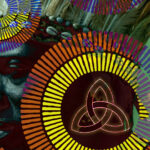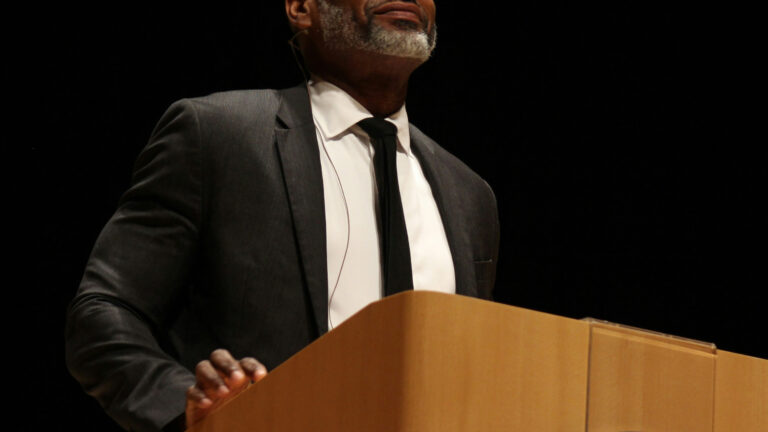Everyone who believes in Christ is a new creation. But what does it mean that we are a new creation? Good question. How we answer this is very important, for it reflects our understanding of Christ’s work on the cross and what it means to be ‘in Christ.’ The language of new creation is inseparable from Jesus’ cross work. When we come to him we partake in his work by faith. The result is that we are a new creation (Galatians 2:20).
Many have cheapened what it means to be a new creation – reducing it to economic or health transformation.
It’s Not About Prosperity
But many, both knowingly and unwittingly, have cheapened our understanding of what it means to be a new creation, reducing it to economic and health transformation. Today it is not uncommon to hear the language of new creation tied to financial prosperity or physical wellbeing. Many teachers in Africa claim that faith in Christ and the fruits of his work primarily refers to this present creation. But that is little more than baptised materialism.
But defining something by what it is not only goes so far. For we are still left asking: what does being a new creation mean? Below I will answer that question.
Stepping Though The Logic
In order to do this we must first explain why re-creation is necessary. Then we will consider the meaning of “new,” as it applies to both believers and the broader creation. Importantly, we must also consider the timing of the new creation – for together with the fallen world we await God’s final restoration of all things (Romans 8:22-23). That being said, God’s work of re-creation is already begun in the work of Christ and through the gospel word.
Why Do We Need Re-creation?
Our first step towards understanding what it means that we are a new creation is asking: ‘Why is there the need for re-creation?’ You do not need to be a theologian to recognise there is much deeply wrong with our world. And if we are honest, the same could be said of each of us. For humanity is innately broken. As James Payton writes, “the line between good and evil does not run out in the universe somewhere… that dividing line runs through each person’s own heart.” Both within and without we are confronted by evil and brokenness.
There’s much deeply wrong with our world. And the same could be said of each of us.
The need for re-creation is due to the brokenness of the world and the sinfulness of man. In the simplest possible terms, the biblical answer to the classic question, “What is God doing about the evil in the world?” is this: “He is re-creating the world through Jesus Christ”.
The Meaning of “New”
God is transforming creation through Jesus Christ. Paul writes, “If anyone is in Christ, he is a new creation. The old has passed away; behold, the new has come” (2 Corinthians 5:17). The Greek word used for “new” here is kainos. It doesn’t refer to that which is recent in time. Rather, it describes what is unaccustomed or unused, in form or quality. It can even contrast a different nature with what is old. Therefore, God is taking this broken world and making it better in form, quality and nature through his Son Jesus Christ.
God is taking this broken world and making it better in form, quality and nature through his Son Jesus Christ.
As one commentator, George Shillington, writes, “What Paul does imply in the context of 2 Corinthians 5:17 is that the new creation emerges out of the old, thus rendering the old inoperative in the presence of the new. The process is redemptive, not destructive, for the new creation does not destroy the old, but recreates it.”
Therefore, in Christ and through the preaching of the gospel, God is redeeming this broken world. He is remaking what was broken by sin. This explains why new creation language is applied to believers.
New Creation Now vs. The Future New Creation
New creation language has nothing to do with your financial status. Nor does it have anything to do with your health. Rather it has to do with moral (or ethical) transformation, while pointing to relational restoration between God and his people. We should also extend it to reconciliation between different people groups.
In the new creation, when Christ consummates his work in his second coming, there will be no more suffering or poverty.
Sure, in the new creation when Christ consummates his work in his second coming, there will be no more suffering, pain and illness, or poverty (Revelation 21:4). “For the former things have passed away.” But that is something God has promised believers in the future, so that they might endure present sufferings. Our sure and confident hope is that we will enter into this glorious rest at Christ’s return. Then we will join the blessed dead (Revelation 14:13).
For the blessedness of a believer is not found in their position, health status, or wealth. It is found in their relationship with Christ. That relationship begins now and will extend into eternity (John 17:3). In the new creation, God’s work of remaking us as individuals will be complete. However, that work is present and ongoing through God’s Spirit and Word, anticipating its glorious consummation. Therefore new creation language applies to our present experience. But how?
Restoration Between God And His People
The language of new creation points to radical relational shift between God and his people. Paul writes about the new creation to the Corinthians: “All this is from God, who through Christ reconciled us to himself and gave us the ministry of reconciliation; that is, in Christ God was reconciling the world to himself, not counting their trespasses against them, and entrusting to us the message of reconciliation” (2 Corinthians 5:18-19).
The gospel or “ministry of reconciliation” is the powerful force that drives the new creation in the present. For by it we are both reconciled to God and the work of restoration is begun.
Those who believe and proclaim the new creation must also embody it.
Therefore being a new creation in Christ means being reconciled with God through Jesus Christ by faith. God extends this invitation to the rest of the world. He uses preaching to proclaim his gracious work. But this preaching must be accompanied by churches that characterise and celebrate this work.
Those who believe and proclaim the new creation must also embody it.
Being A New Creation In The Present
Everyone who comes to Christ receives a new moral standard: Jesus Christ. Paul puts it this way, “The love of Christ controls us, because we have concluded this; that one has died for all, therefore all have died; and he died for all, that those who live might no longer live for themselves but for him who for their sake died and was raised” (2 Corinthians 5:14-15). Therefore when we come to Christ we no longer live for ourselves but for him who died and rose for our sake (Romans 14:7-8).
Everyone who comes to Christ receives a new moral standard: Jesus Christ.
The implications of this cannot be overemphasised. We live in a time and an age where social media is used as a platform to teach us about what acceptable living is. Trending moral or social positions quickly become the standards by which people shape their moral identity. We see this when social media tells us: ‘one can choose their gender identity,’ ‘the woman’s right to her body includes the right to abortion,’ and ‘the BLM movement is the only solution for racial disharmony.’ One could easily enumerate more examples.
Our greatest pursuit as Christians must always be conformity with our Lord.
But the force that must be in control is Christ’s love. As we engage in these huge social and moral issues, seeking to discern right from wrong, and mere trends from important ideological shifts, we cannot abandon our identity in Christ. Thus we must aspire to godliness and obedience, imitating Christ. Our greatest pursuit as Christians must always be conformity with our Lord. Let God’s Word guide both personal and societal transformation.
My New Creation Identity
“Beloved, we are God’s children now, and what we will be has not yet appeared; but we know that when he appears we shall be like him, because we shall see him as he is. And everyone who thus hopes in him purifies himself as he is pure.” (1 John 3:2-3)
As we await the return our Lord Jesus Christ, our hope of glory, let us be careful that we do not allow the world to radically shape our moral and social identity. Let them be rooted in the person of Christ and the new identity he gives us as a result of our hope in him.














